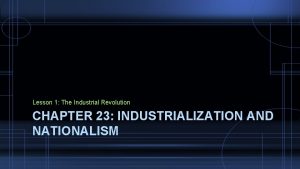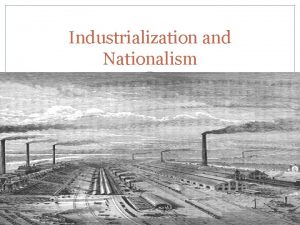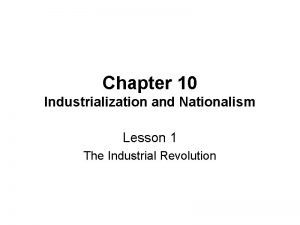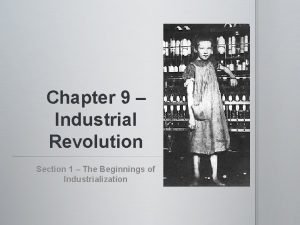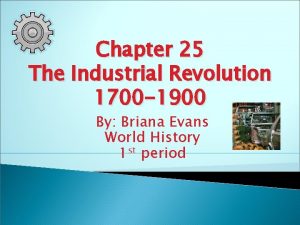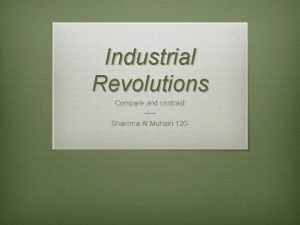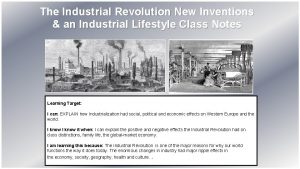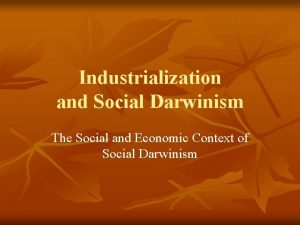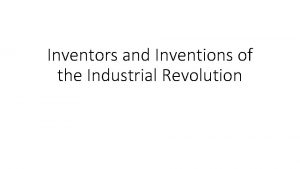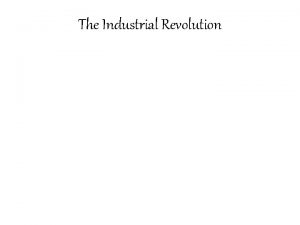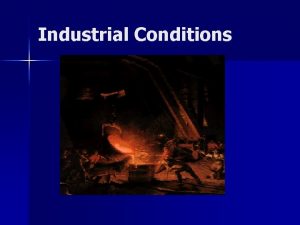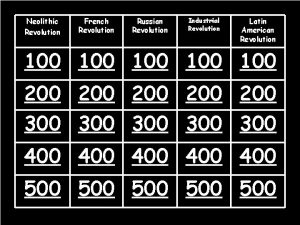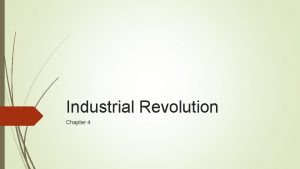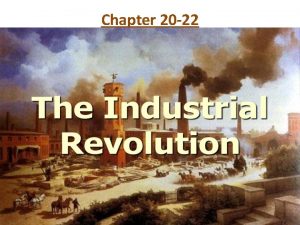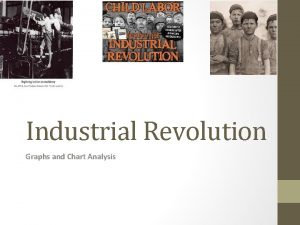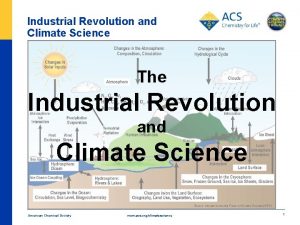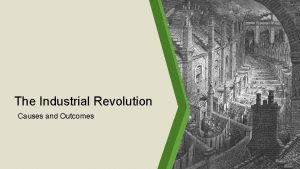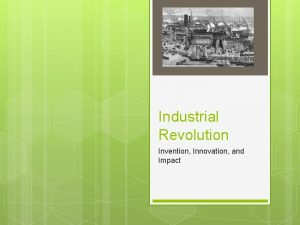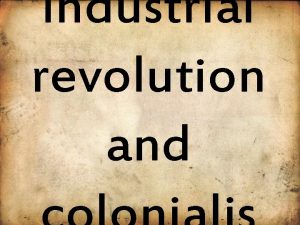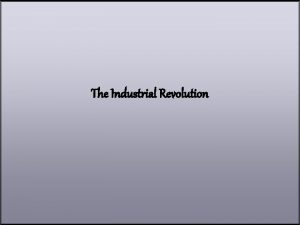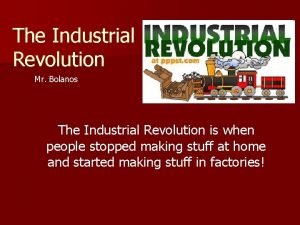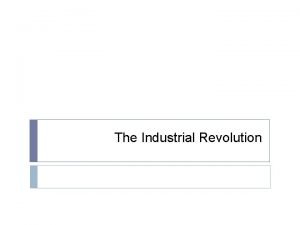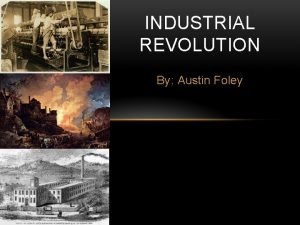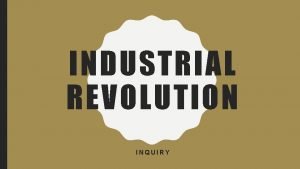Chapter 20 Industrial Revolution The Industrial Revolution and





























- Slides: 29

Chapter 20 Industrial Revolution

The Industrial Revolution and Nationalism § The Industrial Revolution began in Britain, helping to propel the country to its undisputed ranking as the most powerful in the nineteenth century. § The revolution quickly spread throughout much of Europe and untimely the country that would eclipse Britain as the most industrialized – the United States.

Agricultural Revolution Part II § Agricultural output increased for a whole host of reasons. § Potatoes, corn, and other high-yield crops were introduced to Europe from the colonies in the New World. § Farmers started to rotate their crops, rather than leave 1/3 of their land fallow, which allowed them to farm all of their land each season without stripping the land of nutrients.

Agricultural Revolution Part II § Through a process known simply as enclosure, public lands that were shared during the Middle Ages were enclosed by fences. § The Enclosure Movement allowed for private farming and private gain in Great Britain. § Small time farmers were forced off their land into the cities to find work.

Advances in Farming Techniques § What really cranked up the efficiency and productivity of the farms was new technology. § New machines for plowing, seeding, and reaping § Development of chemical fertilizers

Technology Innovations: The Little Engine that Could § Until the mid 18 th century, the domestic drive production of textile in Great Britain. § The domestic system was an inefficient multistep process involving many individuals to produce and get cloth to market. § The demand for cloth drove innovation which eventually led to the development of many inventions in the fostered the Industrial Revolution.

Technology Innovations: The Little Engine that Could § The following inventions helped to move textile production from the home to the factory. – Flying Shuttle John Kay 1733 – Spinning Jenny John Hargreaves 1763 – Cotton Gin Eli Whitney 1793 – Steam Engine James Watt 1769

The Factory System – The factory system allowed goods to be mass produced for a very cheap price but for a considerable profit. § Under Eli Whitney’s system of interchangeable parts, machines and their parts were produced uniformly so that they could be easily replaced when something broke down.

The Factory System – Later Henry Ford’s use of the assembly line meant that each factory worker added only one part to the finished product, one after another.

Factory Life § The factories were manned by thousands of workers, and the system was efficient and inexpensive primarily because those workers were….

• Overworked and extremely underpaid • Regularly put in harm’s way without any insurance or protection • 16 hour workdays were not uncommon • Children as young as six worked next to machines • Women worked long hours at factories and still to fulfill their traditional role at home • Women and children paid quite less than men

Urbanization § Urbanization was a natural outgrowth of increased efficiencies in farming and agriculture. In short, cities grew. § In 1800, there were only 20 cities in Europe with a population of more than 100, 000. § By 1900, 150 cities had similar populations, and the largest London, had a population of 6 million.

Urbanization § Cities developed in areas where resources such as coal, iron, water, and railroads were available for manufacturing. § The more factories that developed in favorable locations, the larger the cities would grow.

Urbanization § The people living in cities endured the following conditions: • Air pollution § Slums/Tenement Buildings (crowded) § Filthy/Smelly (no sewage or sanitation system/waste and garbage filled the streets) § Lack of running water or indoor plumbing § Diseases were common

New Economic and Social Philosophies: No Shortage of Opinions

New Classes • Industrialization created new social classes. The new aristocrats were those who became rich from industrial success. • A middle class formed, made up of managers, accountants, ministers, lawyers, doctors, and other skilled professionals.

Working Class • Finally at the bottom of the pyramid was the working class. • It was huge- made up of factory workers in the cities and peasant farmers in the countryside.

Adam Smith • The rise of the industrial class had its origins in the concept of private ownership. • Adam Smith wrote in The Wealth of Nations (1776) that economic prosperity and fairness is best achieved through private ownership.

Capitalism-Open Market • Adam Smith advocated the following: – Individuals should own the means of production and be able to sell their products and services in a free and open market. – The demand for goods and services would determine their prices and availability. – A free market system (capitalism), Smith argued, would best meets the needs and desires of individuals and nations as a whole. – When governments remove themselves entirely from regulation, this process is called laissez-faire capitalism.

Marx • Karl Marx, a German economist and philosopher who spent a good part of his adult life living in poverty. • Marx pointed out that factory workers had genuine opportunities, but were being exploited as a consequence of capitalism.

Communist Manifesto • Marx believed that the abuses weren’t merely the result of the way in which capitalism was practiced, but an inherent flaw in the system. • In the Communist Manifesto, Marx and Friedrich Engels wrote that working class would eventually revolt and take control of the means of production. • All the instruments of power- the government, the courts, the police, the church- were on the side of the rich against workers.

Communism • Once the class struggle was resolved by the massive uprising of the exploited, Marx predicted that the instruments of power wouldn’t even be needed. • The impact of Marxism was enormous, and served as the foundation for socialism and communism.

Reforms to the Factory System • At the same time, a greater number of people with influence (middle class and aristocracy) began to realize how inhumane the factory system had become and started to do something about it. • These reformers believed that capitalism was a positive development, but the laws were needed to keep its abuses in check.

Split on Reforms • In other words, they believed the government needed to act on behalf of the worker and the factory owners. • By the mid-nineteenth century, there was a major split in the thoughts among intellectuals and policymakers.

Major negative effects of free market capitalism exist in factories and cities Free market capitalism is good, but reform it to minimize the bad effects (US) Free market capitalism is bad, get rid of it and replace it w/ something else (Russia)

Lenin and Marxism • In Russia were absolute rule was strong and the peasant class extremely oppressed, reform was almost nonexistent. § The Marxist ideas grew popular among small group of urban intellectuals. § Eventually including Vladimir Lenin, who believed they could lead a worker revolution and end the tyranny of the czars.

Capitalism and Enlightenment Combine: Reform Catches On • Factory Act of 1883 - British Parliament passed laws that – Limited the hour of the workday – Required factory owners to make working conditions safer and cleaner – Restricted children from working in factories

Unions • Labor Unions Form- were vehicles through which thousands of employees bargained for better working conditions, or threatened to strike § Many changes occurred in the workplace through workers striking.

Social Changes • Women’s Suffrage Movement – 1920 women got the right to vote in the US – 1928 women got the right to vote in the Britain • Social mobility- the ability of a person to work his way up from one social class to the next became more common
 Lesson 1 the industrial revolution
Lesson 1 the industrial revolution Industrialization and nationalism worksheet answers
Industrialization and nationalism worksheet answers Chapter 10 lesson 1 the industrial revolution
Chapter 10 lesson 1 the industrial revolution Chapter 9 the industrial revolution
Chapter 9 the industrial revolution Chapter 25 the industrial revolution
Chapter 25 the industrial revolution First and second industrial revolution
First and second industrial revolution Industrial lifestyle
Industrial lifestyle Dickens industrial revolution
Dickens industrial revolution Industrial revolution and social darwinism
Industrial revolution and social darwinism Bessemer process
Bessemer process Russian revolution vs french revolution
Russian revolution vs french revolution Did american revolution cause french revolution
Did american revolution cause french revolution Definition of third agricultural revolution
Definition of third agricultural revolution Hình ảnh bộ gõ cơ thể búng tay
Hình ảnh bộ gõ cơ thể búng tay Lp html
Lp html Bổ thể
Bổ thể Tỉ lệ cơ thể trẻ em
Tỉ lệ cơ thể trẻ em Gấu đi như thế nào
Gấu đi như thế nào Thang điểm glasgow
Thang điểm glasgow Chúa sống lại
Chúa sống lại Các môn thể thao bắt đầu bằng tiếng bóng
Các môn thể thao bắt đầu bằng tiếng bóng Thế nào là hệ số cao nhất
Thế nào là hệ số cao nhất Các châu lục và đại dương trên thế giới
Các châu lục và đại dương trên thế giới Công thức tiính động năng
Công thức tiính động năng Trời xanh đây là của chúng ta thể thơ
Trời xanh đây là của chúng ta thể thơ Cách giải mật thư tọa độ
Cách giải mật thư tọa độ Phép trừ bù
Phép trừ bù độ dài liên kết
độ dài liên kết Các châu lục và đại dương trên thế giới
Các châu lục và đại dương trên thế giới Thể thơ truyền thống
Thể thơ truyền thống
